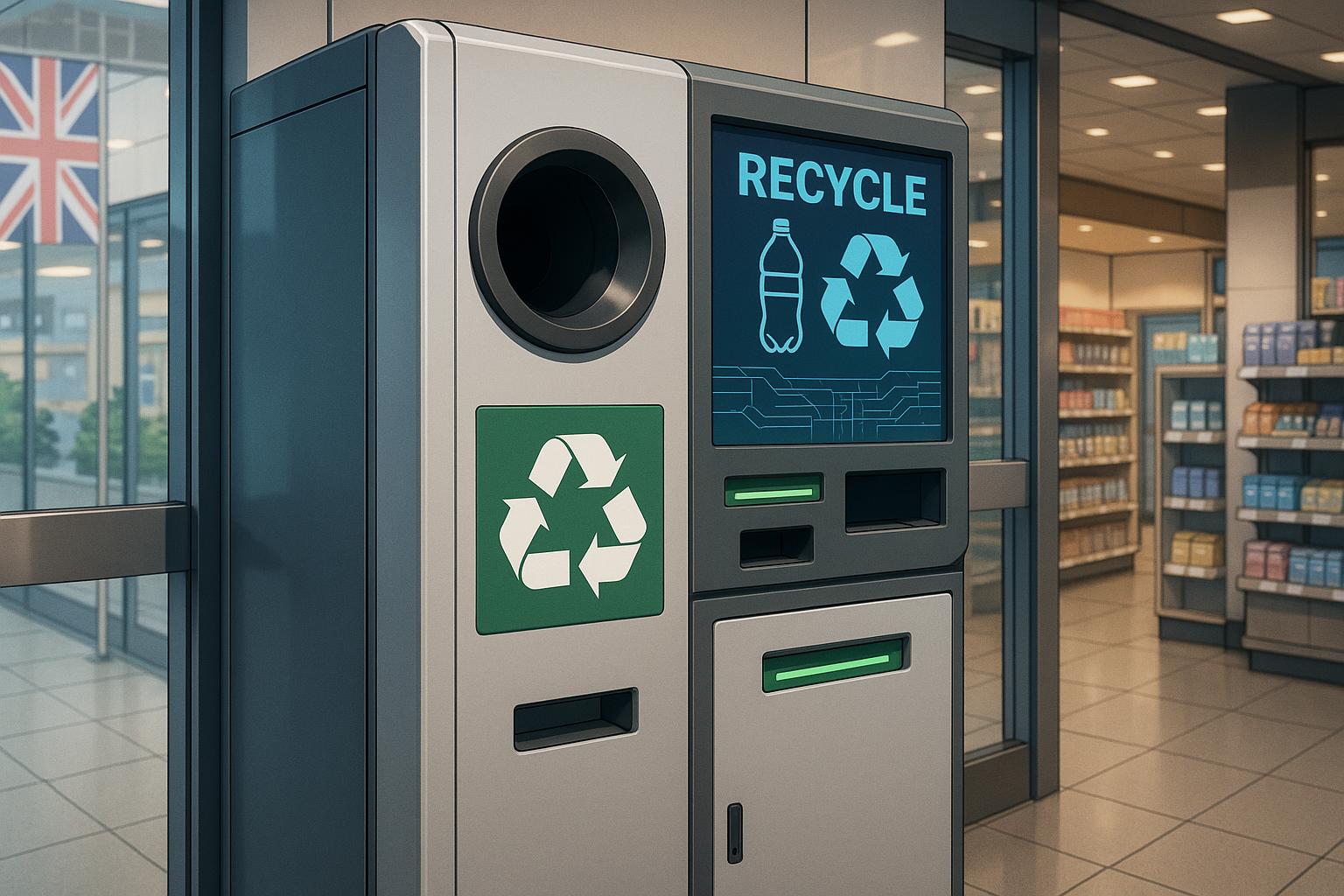TOMRA’s multi-million-pound investment in reverse vending technology at its Bathgate facility highlights local innovation supporting the UK’s rollout of the Deposit Return Scheme by 2027, with MP Kirsteen Sullivan praising its role in advancing national recycling and circular economy goals.
TOMRA, a prominent player in reverse vending technology, recently hosted Kirsteen Sullivan, the Member of Parliament for Bathgate and Linlithgow, at its Scottish storage and distribution centre in Bathgate. During her visit, she was welcomed by John Lee, TOMRA’s Vice-President for Public Affairs UK and Ireland, who highlighted the significance of TOMRA’s investments in the UK.
Sullivan commended the impact of local innovation on national environmental objectives, particularly in relation to the UK’s upcoming Deposit Return Scheme (DRS). She noted, “It’s incredibly inspiring to see a global sustainability leader like TOMRA investing right here in Bathgate.” This sentiment reflects a growing recognition of the role that regional enterprises can play in addressing larger environmental challenges. The introduction of a DRS in the UK, set for implementation by October 2027, aims to streamline waste management and promote recycling across Scotland, England, and Northern Ireland by establishing a uniform deposit level.
TOMRA’s facility in Bathgate represents a significant contribution to these goals, demonstrating a multi-million-pound investment in state-of-the-art reverse vending machines (RVMs) tailored to a range of retail environments. These machines are designed to effectively process both plastic bottles and cans at a rate of up to 200 containers per minute, thus catering to the diverse needs of UK retailers. Their proven systems in Europe achieve impressive recycling return rates of between 92% and 98%, which not only illustrates their effectiveness but also highlights TOMRA’s capacity to assist in resource recovery efforts.
Sullivan elaborated on the potential of DRS, stating it is “one of the most practical and effective tools we have to move towards a circular economy.” The implications of this sentiment are profound, as communities across the UK look towards innovative solutions to treat waste as a resource rather than refuse. John Lee echoed these thoughts, emphasising the importance of parliamentary support to ensure the DRS’s successful launch and the creation of local job opportunities in Scotland. He stated, “Maintaining our presence in Bathgate will ensure we can provide an excellent service to our customers across the country.”
The UK government’s commitment to a consistent DRS aligns with increasing demands for sustainable practices among consumers and businesses alike. The introduction of such schemes has been part of a broader shift towards environmental sustainability, with recent trials—including those in collaboration with retailers like Sainsbury’s—signifying the private sector’s engagement in these goals. Sainsbury’s piloted a reverse vending initiative in Newbury, accepting multiple types of drink containers, thus becoming a forerunner in the DRS landscape.
Through TOMRA’s Bathgate operations, UK communities are poised to benefit from increased recycling capabilities and reduced waste, paving the way for a greener and more sustainable future. As the UK gears up to embrace DRS, the collaborative efforts of companies like TOMRA and forward-thinking representatives like Sullivan illustrate the critical intersection of local innovation and national environmental policy.
 Reference Map:
Reference Map:
Source: Noah Wire Services
- https://www.dailyrecord.co.uk/news/local-news/bathgate-mp-praises-role-company-35370821 – Please view link – unable to able to access data
- https://www.tomra.com/en-gb/reverse-vending/our-offering/reverse-vending-machines – TOMRA offers a range of reverse vending machines tailored for UK retailers, accommodating various store sizes and recycling needs. Their machines accept plastic bottles and cans, with capacities ranging from 17 to 200 containers per minute. Designed to support the UK’s upcoming deposit return scheme, TOMRA’s solutions aim to make recycling efficient and accessible for businesses of all sizes.
- https://www.letsrecycle.com/news/sainsburys-includes-glass-in-reverse-vending-trial/ – In August 2019, Sainsbury’s in Newbury, Berkshire, launched a trial of reverse vending technology that accepts glass bottles, PET bottles, and cans. This initiative, in partnership with TOMRA, marked the first such trial in England to include glass, ahead of the planned deposit return scheme for drinks packaging. Shoppers received a 5p coupon for each qualifying container returned.
- https://www.recyclingtoday.com/news/sainsbury-supermarket-tests-tomra-reverse-vending-technology-glass-pet-cans/ – Sainsbury’s supermarket in Newbury, Berkshire, began testing reverse vending technology in August 2019, accepting glass bottles, PET bottles, and cans. This trial, conducted with TOMRA, was the first of its kind in England to include glass, aligning with the UK’s move towards an all-inclusive deposit return scheme. Customers were incentivised with a 5p coupon for each returned container.
- https://www.kirsteensullivan.org.uk/ – Kirsteen Sullivan is the Member of Parliament for Bathgate and Linlithgow, elected in July 2024. A member of the Labour and Co-operative Party, she focuses on local issues such as supporting businesses, improving public services, and driving investment in her constituency. Sullivan is also involved in All-Party Parliamentary Groups for Sexual Exploitation and Menopause, ensuring local concerns contribute to national conversations.
- https://www.tomra.com/en-gb/reverse-vending/media-center/feature-articles/inside-reverse-vending-machines – TOMRA provides insights into the technology behind their reverse vending machines, highlighting sensor technology and innovations that enhance recycling efficiency. Their machines are designed to accept various materials, including plastic and glass bottles, as well as cans, supporting the UK’s efforts towards a circular economy and higher recycling rates.
- https://www.recyclingtoday.com/news/tomra-reverse-vending-machines-uk-recycling/ – TOMRA, a Norwegian company, advocates for the adoption of reverse vending machines (RVMs) in the UK as part of a deposit-return scheme. Their RVMs are designed to collect used beverage containers, aiming to increase recycling rates and reduce waste. TOMRA’s experience in over 60 markets positions them as a key player in the UK’s recycling initiatives.













